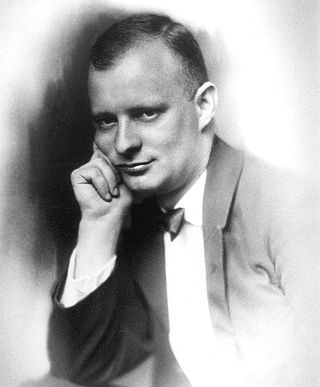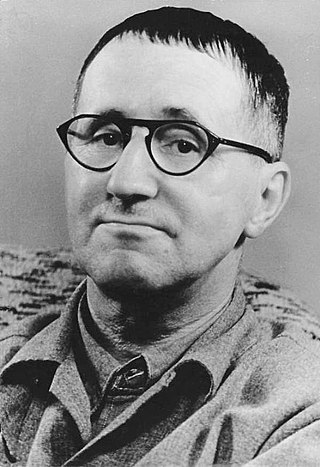
Epic theatre is a theatrical movement that arose in the early to mid-20th century from the theories and practice of a number of theatre practitioners who responded to the political climate of the time through the creation of new political dramas. Epic theatre is not meant to refer to the scale or the scope of the work, but rather to the form that it takes. Epic theatre emphasizes the audience's perspective and reaction to the piece through a variety of techniques that deliberately cause them to individually engage in a different way. The purpose of epic theatre is not to encourage an audience to suspend their disbelief, but rather to force them to see their world as it is.

Life of Galileo, also known as Galileo, is a play by the 20th century German dramatist Bertolt Brecht and collaborator Margarete Steffin with incidental music by Hanns Eisler. The play was written in 1938 and received its first theatrical production at the Zurich Schauspielhaus, opening on the 9th of September 1943. This production was directed by Leonard Steckel, with set-design by Teo Otto. The cast included Steckel himself, Karl Paryla and Wolfgang Langhoff.
The Mother is a play by the German modernist playwright Bertolt Brecht. It is based on Maxim Gorky's 1906 novel of the same name.

Baal was the first full-length play written by the German modernist playwright Bertolt Brecht. It concerns a wastrel youth who becomes involved in several sexual affairs and at least one murder. It was written in 1918, when Brecht was a 20-year-old student at Munich University, in response to the expressionist drama The Loner by the soon-to-become-Nazi dramatist Hanns Johst.

Baal is an EP by English musician David Bowie, comprising recordings of songs written for Bertolt Brecht’s play Baal. It is sometimes referred to as David Bowie in Bertolt Brecht's Baal, as credited on the sleeve. The EP was Bowie's final release of new material for RCA Records; he signed with EMI Records for his next album.

Drums in the Night is a play by the German playwright Bertolt Brecht. Brecht wrote it between 1919 and 1920, and it received its first theatrical production in 1922. It is in the Expressionist style of Ernst Toller and Georg Kaiser. The play—along with Baal and In the Jungle—won the Kleist Prize for 1922 ; the play was performed all over Germany as a result. Brecht later claimed that he had only written it as a source of income.
Man Equals Man, or A Man's a Man, is a play by the German modernist playwright Bertolt Brecht. One of Brecht's earlier works, it explores themes of war, human fungibility, and identity. One of the agitprop works inspired by the developments in USSR praising the bolshevik collectivism and replaceability of each member of the collective.

The Baden-Baden Lesson on Consent is a Lehrstück by the German dramatist Bertolt Brecht, written in collaboration with Slatan Dudow and Elisabeth Hauptmann. Under the title Lehrstück it was first performed, with music by Paul Hindemith, as part of the Baden-Baden festival on 28 July 1929, at the Stadthalle, Baden-Baden, directed by Brecht, designed by Heinz Porep.
In the Jungle of Cities is a play by the German modernist playwright Bertolt Brecht. Written between 1921 and 1924, it received its first theatrical production under the title Im Dickicht at the Residenztheater in Munich, opening on 9 May 1923. This production was directed by Erich Engel, with set design by Caspar Neher. The cast included Otto Wernicke as Shlink the lumber dealer, Erwin Faber as George Garga, and Maria Koppenhöfer as his sister Mary. Im Dickicht was produced at Max Reinhardt's Deutsches Theater in Berlin, where Brecht had been employed as a dramaturg. The production opened on 29 October 1924, with the same director and scenographer, but in a cut version with a new prologue and the title Dickicht: Untergang einer Familie. Fritz Kortner played Shlink and Walter Frank played George, with Franziska Kinz, Paul Bildt, Mathias Wieman, and Gerda Müller also in the cast. Willett and Manheim report that this production "was not a success".
Driving Out a Devil is an early one-act farce by the 20th-century German dramatist Bertolt Brecht. It was written in prose, probably in 1919, and was first published in volume 13 of Brecht's Stücke. The play charts the attempts of a self-confident and manipulative Bavarian peasant boy to outwit the vigilant parents of a girl of his village. Ronald Hayman suggests that this play dramatises most clearly Brecht's own ability to influence people.

Mahagonny, ein Songspiel, or Mahagonny, a song-play, was written by composer Kurt Weill and dramatist Bertolt Brecht and first performed with that title and description in 1927. Elisabeth Hauptmann contributed the words to two of its songs. Just under half an hour in length, the work can be thought of as a staged or scenic cantata. By the end of 1929, however, Mahagonny had grown into a two-hour opera with the title Aufstieg und Fall der Stadt Mahagonny, or Rise and Fall of the City of Mahagonny. This was premiered in March 1930. Today the cantata and the opera are considered separately, the latter holding a place in the repertory, the former being an occasional piece staged in small theaters or programmed as an outgrowth of a song recital when resources permit. For this reason the shorter work is informally referred to as Das kleine Mahagonny, or The Little Mahagonny, or as Mahagonny-Songspiel.
Turandot or the Whitewashers' Congress is an epic comedy by the German modernist playwright Bertolt Brecht. It was written during the summer of 1953 in Buckow and substantially revised in light of a brief period of rehearsals in 1954, though it was still incomplete at the time of Brecht's death in 1956 and did not receive its first production until several years later. It premièred on 5 February 1969 at the Zürich Schauspielhaus, in a production directed by Benno Besson and Horst Sagert, with music by Yehoshua Lakner.

Der Jasager is an opera by Kurt Weill to a German libretto by Bertolt Brecht.
Die Verurteilung des Lukullus is an opera by Paul Dessau to a libretto by the German dramatist Bertolt Brecht.
The Good Person of Szechwan is a play written by the German dramatist Bertolt Brecht, in collaboration with Margarete Steffin and Ruth Berlau. The play was begun in 1938 but not completed until 1941, while the author was in exile in the United States. It was first performed in 1943 at the Zürich Schauspielhaus in Switzerland, with a musical score and songs by Swiss composer Huldreich Georg Früh. Today, Paul Dessau's composition of the songs from 1947 to 1948, also authorized by Brecht, is the better-known version. The play is an example of Brecht's "non-Aristotelian drama", a dramatic form intended to be staged with the methods of epic theatre. The play is a parable set in the Chinese "city of Sichuan".

Galileo is a 1975 biographical film about the 16th- and 17th-century scientist Galileo Galilei, whose astronomical observations with the newly invented telescope led to a profound conflict with the Roman Catholic Church. The film is an adaptation of Bertolt Brecht's 1943 play of the same name. The film was produced by Ely Landau for the American Film Theatre, which presented thirteen film adaptations of plays in the United States from 1973 to 1975. Brecht's play was recently called a "masterpiece" by veteran theater critic Michael Billington, as Martin Esslin had in 1960. The film's director, Joseph Losey, had also directed the first performances of the play in 1947 in the US — with Brecht's active participation. The film is fairly true to those first performances, and is thus of historical significance as well.

Eugen Berthold Friedrich Brecht, known professionally as Bertolt Brecht, was a German theatre practitioner, playwright, and poet. Coming of age during the Weimar Republic, he had his first successes as a playwright in Munich and moved to Berlin in 1924, where he wrote The Threepenny Opera with Kurt Weill and began a life-long collaboration with the composer Hanns Eisler. Immersed in Marxist thought during this period, he wrote didactic Lehrstücke and became a leading theoretician of epic theatre and the Verfremdungseffekt.

Yılmaz Onay was a Turkish author, theatre director and translator.

Ventseslav Konstantinov was a Bulgarian writer, aphorist and translator of German and English literature.











